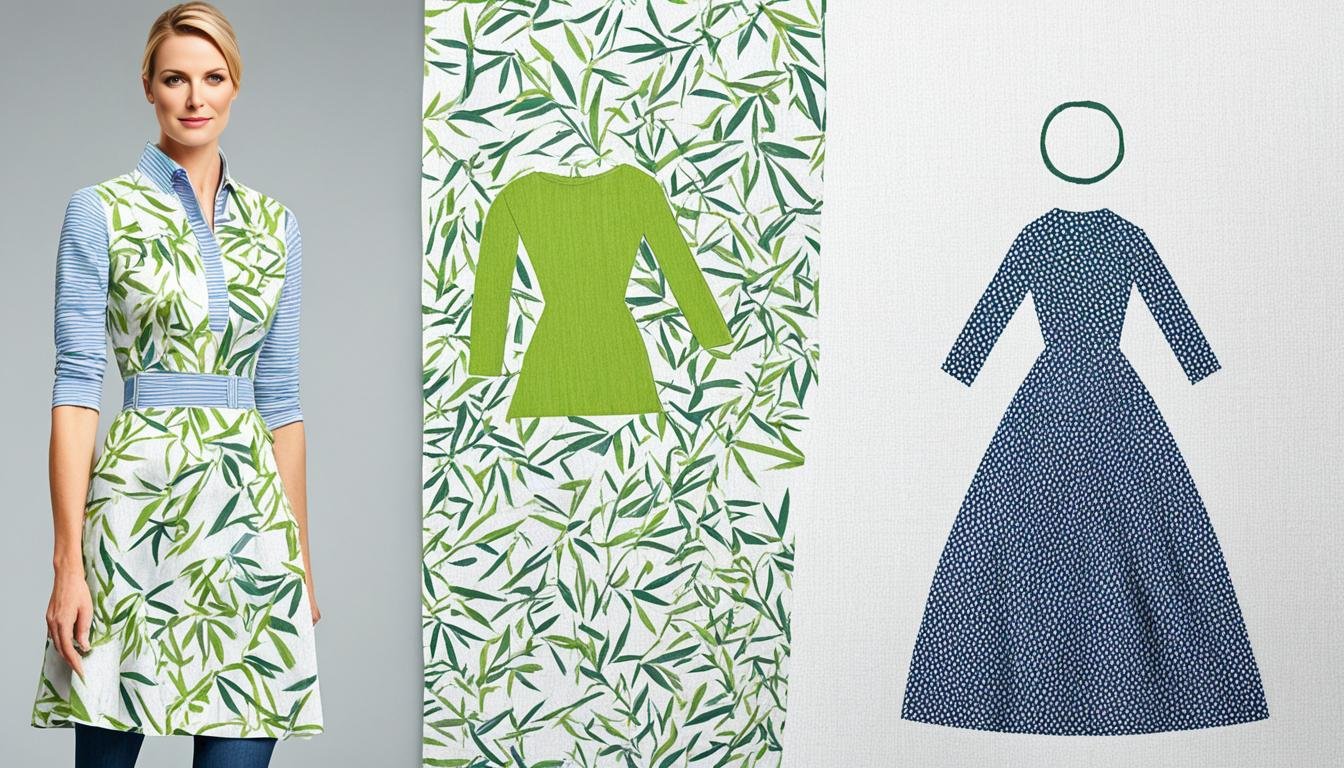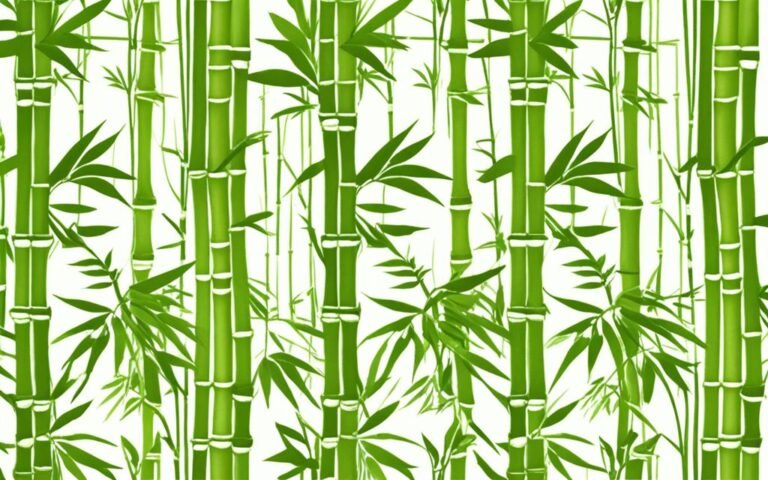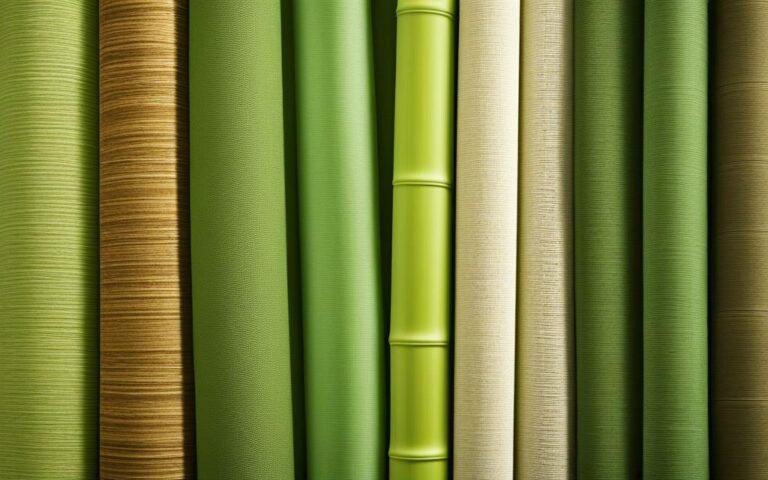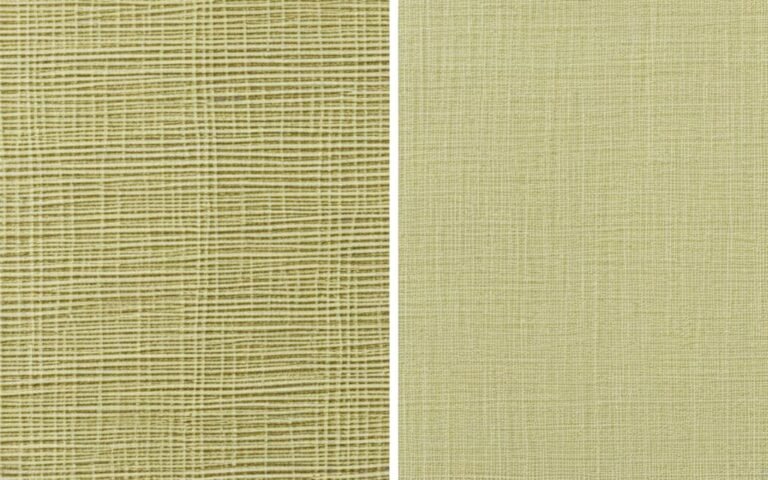Every year, the global population uses a huge 27 million tonnes of cotton. In this scene, bamboo fabric has risen as a strong contender. It’s known for its sustainable textiles virtues. This rise makes us ask: bamboo fabric vs cotton, which is better for us and the planet? To find the answer, we need to look closely at these two organic materials.
Bamboo fabric comes from the durable grass and is getting famous for being soft yet strong. It provides a luxury feel without losing its strength, challenging cotton’s top position. Bamboo’s natural sustainability benefits make the bamboo vs cotton sustainability debate very important for those who care about the environment.
This competition is not just about how they feel but their environmental impacts, life spans, and how comfortable they are on our skin. As we focus more on eco-friendly choices, the battle between bamboo fabric vs cotton is about what we value and our planet’s health.
Key Takeaways
- Bamboo fabric is known for its incredible softness and long-lasting wear compared to cotton.
- Because it grows quickly and doesn’t ask for much, bamboo’s sustainability is noteworthy.
- Cotton might feel traditional and comfy, but it can harm the environment with its need for water and chemicals.
- Looking at sustainability, bamboo stands out as kinder to the environment and more efficient in resource use.
- Bamboos fabric’s breathability makes it perfect for hot climates and physical activities.
- When considering long-term value, bamboo’s durability and low maintenance might make it a smarter choice.
Introduction to Natural Fabric Comparison
More people now prefer eco-friendly options, heating up the natural fabric comparison debate. This is true especially when discussing bamboo versus cotton. By exploring the unique traits and history of these organic materials, we can decide which is better, especially for summer wear.
Defining Bamboo Fabric and Cotton
Bamboo fabric is made from the bamboo plant. Some methods use harsh chemicals, while others are eco-friendly. Bamboo viscose and bamboo lyocell are examples of these different processes. Cotton comes from the fluff of the cotton plant and is known for its comfort and being hypoallergenic. However, it’s also known for needing a lot of water and chemicals to produce.
Historical Overview and Recent Trends in Fabric Usage
Cotton has dressed people worldwide for thousands of years. It’s found in everything from clothes to industrial goods. Bamboo is newer in the fabric market but has been important in Asia for a long time, mostly for medicine and building. It became popular in Western clothing in the early 2000s for its softness, ability to wick moisture, and temperature control, answering the question of is cotton or bamboo better for summer.
Lately, bamboo is becoming more popular because it’s seen as more sustainable. This change is helped by improvements that make bamboo textiles softer and stronger. It’s challenging cotton’s long-standing position and changing how we view natural fabric comparison today.
Bamboo Fabric vs Cotton: Analysing the Textural Differences
When we explore textiles, we see bamboo fabric and bamboo fabric vs cotton have unique feels. Choosing the right fabric isn’t just about taste. It’s about understanding how they feel against our skin.
Bamboo’s Silky Softness Versus Cotton’s Traditional Comfort
Bamboo fabric is known for being incredibly soft, similar to silk. This makes it a preferred choice for luxury items. Its softness comes from long, smooth fibres, giving a silk-like texture without being slippery.
The Impact of Fibre Structure on Skin Sensation
Bamboo fibres feel special due to their structure. They have micro-gaps and holes, making bamboo breathable. Cotton is soft too but feels more traditional. Its feel depends on how it’s woven.
The difference between bamboo and cotton textures is clear when you compare them:
| Feature | Bamboo Fabric | Cotton |
|---|---|---|
| Softness | Very soft with a silky texture | Soft, varies with weave |
| Stretchiness | Naturally stretchy, adapts well | Less stretchy unless treated |
| Breathability | Highly breathable, good for skin health | Moderately breathable, can retain moisture |
| Hypoallergenic Properties | Hypoallergenic, better for sensitive skin | Somewhat hypoallergenic, but can irritate sensitive skin |
In deciding between cotton vs bamboo sustainability, texture and skin sensitivity matter. With cotton common and bamboo gaining fans for its eco-friendliness, we think about comfort and the planet.
The Durability Showdown: Cotton and Bamboo Put to the Test
When it comes to lasting materials, it’s key to know which stand up to the test. Bamboo and cotton both have traits that make them last long and resist damage. We will look at each material’s durability to help you choose wisely for your next purchase.
Longevity of Bamboo Garments
Bamboo clothing is known for lasting a long time. It doesn’t shrink, fade, or pill easily. This helps bamboo clothing stay in good shape, even after lots of wears and washes. Bamboo fibres are really strong, adding to the life of your clothes. This makes bamboo a top choice for those looking for lasting organic materials.
Cotton’s Strength and Resistance to Wear and Tear
Cotton is tough, especially for outdoor and work clothes. It’s even strong when it gets wet. But, cotton might need replacing more often than bamboo because it wears down. To keep cotton in good condition, it’s best to wash it in cool water and dry it gently.
| Feature | Bamboo | Cotton |
|---|---|---|
| Lifespan | Longer due to resistance to pilling and shrinking | Shorter, frequent replacements needed |
| Strength when wet | Remains strong, less prone to damage | Highly durable, suitable for rugged use |
| Care recommendations | Cool wash, air dry for best results | Cool wash, gentle drying needed |
Choosing between bamboo and cotton is about finding the right balance. It’s about what feels good, matches your eco-values, and suits your lifestyle in terms of care and wear. Both materials have their own benefits, making your wardrobe diverse and eco-friendly.
Which Offers Superior Comfort?
When we consider comfort, bamboo and cotton have different benefits. Bamboo clothing is often softer, making it the top choice for comfort. Its fibres are silky and smooth, which feels nice against the skin. This is unlike traditional cotton, which can’t match bamboo’s softness and flexibility.
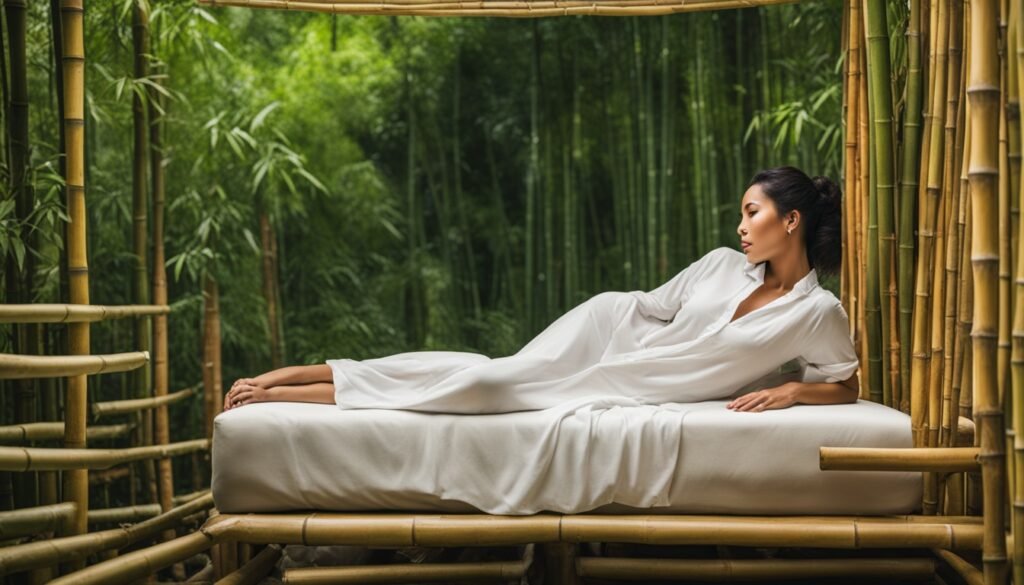
Bamboo isn’t just about being soft to the touch. It’s also great for people with sensitive skin because it’s hypoallergenic and has antimicrobial properties. This means it won’t irritate your skin. Plus, bamboo fabric keeps you cool in summer and warm in winter, making it even more comfortable to wear.
Let’s look at a table to better understand why bamboo often scores higher in comfort than cotton:
| Feature | Bamboo | Cotton |
|---|---|---|
| Softness | Exceptionally soft | Lacks the silky quality |
| Hypoallergenic | Yes | Seldom |
| Antimicrobial | Yes | No |
| Odour Resistance | High | Low |
| Temperature Regulation | Excellent | Good |
Choosing between bamboo and cotton? Bamboo often ranks higher for comfort. This makes it a perfect choice for those who value comfort in their clothes, especially for long wear and in different weather.
Eco-Friendly Aspects of Sustainable Textiles
The textile industry is paying more attention to being green. It favours eco-friendly textiles that come from organic materials. When comparing bamboo vs cotton sustainability, we find interesting facts about their environmental effects.
Bamboo’s Rapid Growth and Minimal Resource Needs
Bamboo grows quickly without using lots of resources. It can shoot up to 91 cm in just one day. This makes it a great renewable resource. Also, it grows without needing pesticides and fertilisers, which lessens its environmental impact.
Cotton’s Water Consumption and Chemical Usage
On the other hand, cotton farming uses a lot of water and chemicals. To make just one kilogram of cotton, about 10,000 litres of water is needed. This shows the sustainability problems with cotton. The pesticides and fertilisers in cotton farming can harm the soil and environment in the long run.
Agricultural Practices and Environmental Impact
Growing bamboo is usually more eco-friendly than growing cotton. Bamboo supports natural growth and helps biodiversity. It also doesn’t pollute ecosystems with chemicals. Cotton farming, however, takes a lot from the soil and pollutes water and land with pesticides and herbicides.
Processing Methods and Chemical Usage
Bamboo can become fabric through less harmful methods like making bamboo lyocell. This uses fewer dangerous chemicals than producing bamboo viscose. Cotton’s process to become fabric involves lots of chemicals. These can release toxic substances into our environment.
| Aspect | Bamboo | Cotton |
|---|---|---|
| Water Usage | Low | High |
| Chemical Usage | Low (Especially in Lyocell Production) | High (Pesticides and Fertilisers) |
| Environmental Impact | Minimal (Promotes Biodiversity) | Significant (Soil and Water Pollution) |
| Sustainability | High (Fast Renewability) | Low (Resource Intensive) |
Cost-Effectiveness and Value for Money
Choosing between bamboo and cotton involves looking at cost-effectiveness and value for money in sustainable fabrics. Bamboo fabric may cost more upfront than cotton. Yet, its benefits can lead to bigger savings over time.
Analysing the Long-Term Financial Benefits
Bamboo fabric is known for its lasting quality. This can mean buying new clothes less often. Because bamboo clothes keep their quality for a while, you save money in the long term. The cost-effectiveness of bamboo fabric is clear with its lasting use.
Is Cheap Always the Best Option?
At first, cheaper options like cotton seem good due to low initial costs. But looking ahead, bamboo fabric could be the better deal. It needs less washing and lasts longer. Bamboo is good for both the planet and your pocket.
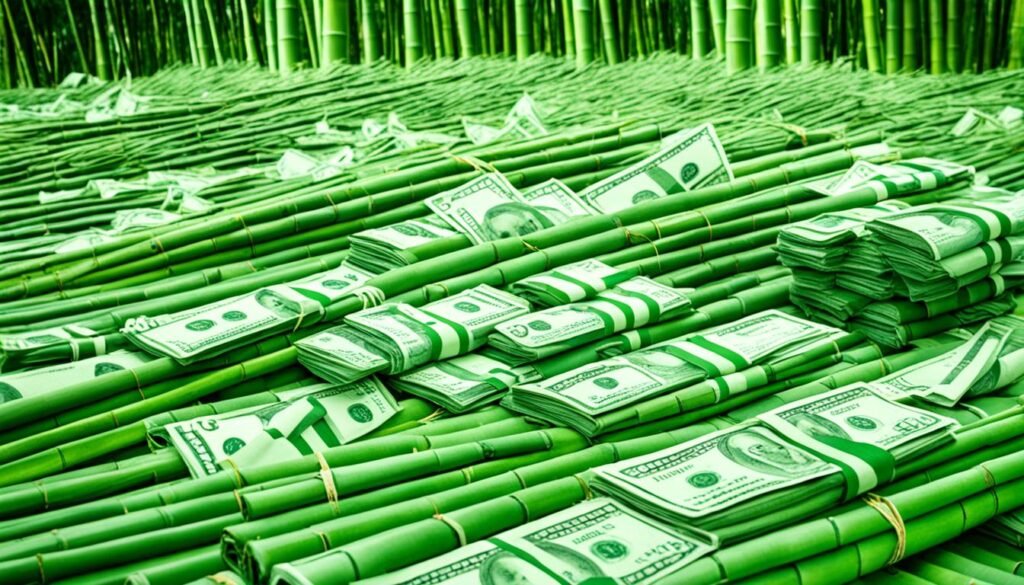
If you’re thinking about your budget and the planet, bamboo fabric makes a strong case. It’s durable, eco-friendly, and cost-efficient. This makes bamboo a wise choice for those wanting to be eco-conscious and economical.
Is Cotton or Bamboo Better for Summer? Climate Considerations
As summer approaches, the fabric we choose plays a big role in how comfy we feel outdoors. Cotton and bamboo offer different benefits for the summer heat. Let’s explore which is the best pick for those bright, sunny days.
Breathability and Moisture-Wicking Properties
Bamboo fabric stands out for its breathability and ability to wick away moisture. This makes it top choice for summer clothing. It has tiny gaps and holes that let air flow, keeping your skin cool and reducing sweat. Cotton, though breathable, tends to hold onto moisture, which can feel wet on very hot days.
Thermal Regulation for Seasonal Appropriateness
Bamboo is also great at keeping you cool when it’s hot. This feature is perfect for summer activities, helping to keep your body at a comfortable temperature. Cotton is naturally breathable but bamboo’s temperature control and light weight may make it a better choice for daily outfits and sports gear in the heat.
In the end, the decision between bamboo and cotton for summer depends on what you value more in fabrics like moisture control and temperature regulation. Bamboo outshines cotton in these areas, making it a potentially better choice in warm and humid weather.
Conclusion
In comparing natural fabrics like bamboo and cotton, we find good points for both. Cotton has been a favourite for its ease of access and familiar comfort. Yet, bamboo fabric vs cotton stands out for its softness and ability to keep moisture away. This gives bamboo a luxurious feel without losing on usefulness.
Talking about cotton vs bamboo sustainability, bamboo is often praised for being eco-friendly. It grows quickly and needs less water and chemicals. This makes a strong case for bamboo as a green choice. Also, bamboo clothes last longer, meaning you won’t have to replace them as often. This helps to reduce waste.
The world of natural fabrics is changing. Choosing between bamboo and cotton isn’t simple. It’s not just about how they feel or last. You have to think about the environment and your budget too. Everyone has to make their own choice. But as people become more eco-conscious, bamboo fabric is becoming more popular. It seems set to play a big role in the future of fabrics.
FAQ
What are the benefits of bamboo fabric over cotton?
Bamboo fabric is soft, durable, and keeps you dry. It’s great for summer clothes. Unlike cotton, it’s hypoallergenic and doesn’t hold odours, making it more comfortable. Bamboo also grows quickly and needs fewer resources, making it a more sustainable choice.
How does the texture of bamboo fabric compare to cotton?
Bamboo fabric feels softer and silkier than cotton. Its fibres make it smooth on the skin. This makes it comfy for sensitive skin. While cotton can be soft, bamboo feels luxurious, much like silk.
Is bamboo fabric more durable than cotton?
Yes, bamboo fabric lasts longer than cotton. It doesn’t shrink, stretch, or tear easily. This means it keeps its shape and quality longer, so you won’t have to replace it as often.
Are bamboo fabrics more eco-friendly than cotton?
Bamboo is seen as more eco-friendly. It grows fast, doesn’t need chemicals, and uses less water. But, its eco-friendliness also depends on how it’s made. Bamboo lyocell is greener than bamboo viscose.
Which is cheaper, bamboo or cotton?
Cotton is usually cheaper to buy than bamboo. But bamboo’s durability and lower care needs can make it a better deal in the long run. So, bamboo might save you money over time.
Is cotton or bamboo better for people with allergies or sensitive skin?
Bamboo is often better for allergies or sensitive skin. It’s hypoallergic and naturally fights microbes, reducing skin irritation.
How do bamboo and cotton compare in terms of water consumption and agricultural chemicals?
Bamboo uses far less water than cotton and usually doesn’t need chemicals. Cotton needs a lot of water and often uses chemicals. This makes bamboo more eco-conscious.
Can you explain the thermal regulating properties of bamboo fabric?
Bamboo fabric helps keep you cool in summer by moving moisture away and letting your skin breathe. When it’s cold, it also keeps you warm. This makes it comfy in any weather.
Is bamboo fabric or cotton better for summer clothing?
Bamboo is better for summer clothes. It wicks moisture and helps control body heat, keeping you dry and comfortable in the heat.

